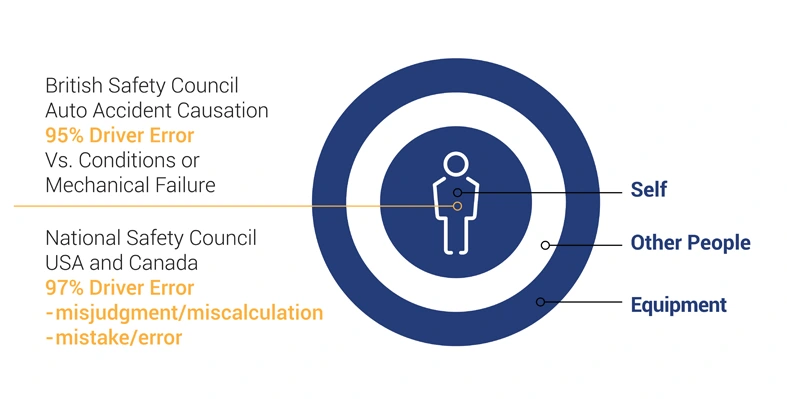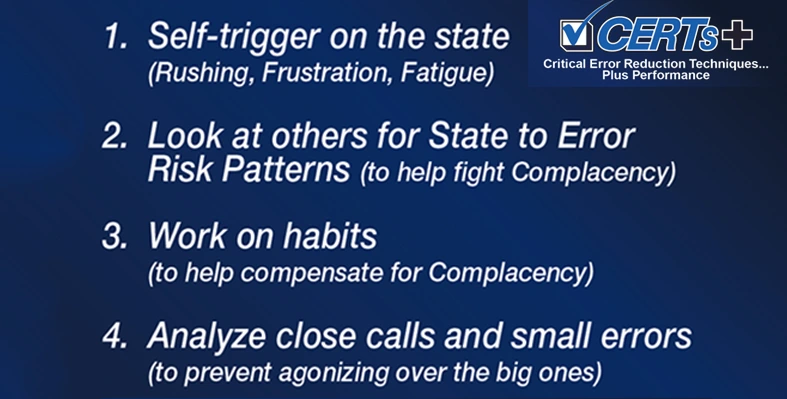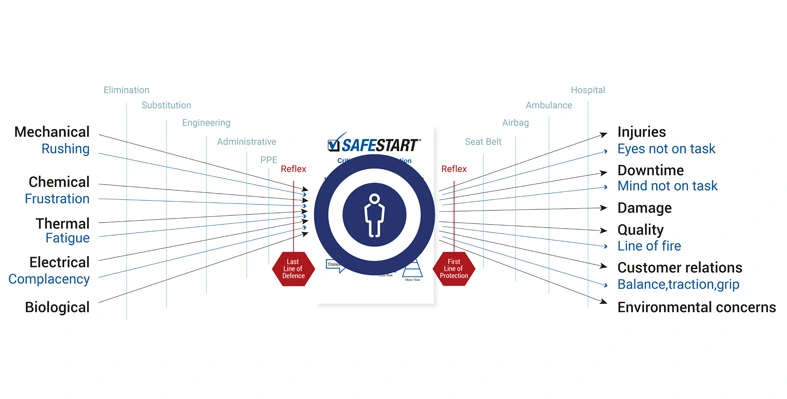
Understanding and leveraging the benefits of reflexes offers a powerful opportunity to prevent serious injuries. (Image source: SafeStart)
When discussing risk management and workplace safety, Personal Protective Equipment (PPE) is often regarded as the last line of defence. This traditional approach, doesn’t account for the most basic protective measures, especially those involving mechanical or kinetic energy.
The role of reflex actions in preventing incidents is a critical factor which is often overlooked. Understanding and leveraging the benefits of reflexes offers a powerful opportunity to prevent serious injuries and fatalities in the workplace.
The traditional model of safety management follows the hierarchy of controls, which places PPE as the last line of defence, a final measure after other controls have failed. However, in certain cases, PPE functions as an escalation control, protecting workers after an incident has already begun. Seat belts, fall arrest harness and similar gear do not prevent accidents but aim to reduce the severity of injuries once an error has occurred. While PPE plays an important role, reflex actions serve as the true last line of defence and the first line of protection in many scenarios.
The Bowtie Model helps illustrate this by mapping sources of hazardous energy—whether mechanical, chemical, thermal, electrical, or biological—and categorising controls into prevention and mitigation. In most cases (over 90%), mechanical or kinetic energy is the source of serious workplace injuries and fatalities, and as a result reflexes or whether the person will get the benefit of their reflexes becomes a critical factor in terms of the potential severity of the outcome. Outside the controlled work environment, where situations are more unpredictable, reflex actions often determine the difference between a close call or near-miss and a fatality. For instance, a reflexive movement could help a pedestrian avoid being hit by an oncoming vehicle.
Traditional safety practices tend to focus on high-risk activities through rules, procedures, and PPE. However, the majority of serious incidents occur during medium or low-risk tasks. Data from over 400 fatal workplace incident reports shows that 47-71% of these fatalities could have been avoided or lessened had the workers benefited from reflexive responses.

The data also reveals that in over 95% of incidents, the unexpected event that caused the injury stems from the individual themselves. Whether it’s due to rushing, fatigue, frustration, or complacency, human factors play a critical role in workplace safety. Reflexes are key to mitigating incidents in these medium to lower-risk scenarios, where more traditional controls may not be as effective.
The role of reflexes in preventing serious injuries
Reflexes are innate to humans and tested at birth to ensure they function properly. However, whether someone gets the benefit of their reflexes is influenced by human factors such as rushing, frustration, fatigue and complacency, which can cause eyes not on task and mind not on task. If a person’s mind is not on task due to complacency, their reflexes can still help prevent accidents, even if the reflex is a bit slower. But if their eyes are also off task, then they might not get a reflex at all, which can significantly increase the risk of a serious injury or fatality.
 External factors like technology can exacerbate the issue. Mobile phones and fast-paced environments condition our brains to experience shorter bursts of focus, leaving us vulnerable to distractions.
External factors like technology can exacerbate the issue. Mobile phones and fast-paced environments condition our brains to experience shorter bursts of focus, leaving us vulnerable to distractions.
This highlights the importance of critical error reduction techniques, such as self-triggering on states like rushing, frustration and fatigue, as individuals can feel and identify these states in the moment and then quickly think about keeping their eyes and mind on task. Complacency, on the other hand, is more passive and harder to detect.
One way to counteract complacency is to build strong safety-related habits, such as maintaining visual awareness before moving hands, feet, body or machinery. These habits ensure that employees will still get the benefit of their reflexes even if their minds are not on task, because they will still be looking at what they are doing.
At an organisational level, addressing human factors is crucial for reducing incident rates. Employers can help by ensuring workers have adequate rest, hydration, and a work environment that minimises unnecessary stress. When examining the Bowtie Model, it becomes clear that human factors like rushing, frustration, fatigue, and complacency need to be considered along with the various forms of hazardous energy as these factors lead to critical errors such as "eyes not on task" and "mind not on task," which can severely impact reflexive responses. By understanding and implementing critical error reduction techniques, organisations and individuals can add an extra layer of protection, leveraging reflexes as both a preventative and mitigation tool in workplace safety.
In conclusion, the role of human factors and reflexes and their significance as the real last line of defence and first line of protection has been largely overlooked in workplace safety. Organisations that focus on enhancing cognitive effectiveness and reflexive responses have a much better chance of preventing serious incidents or reducing their consequences.

To explore the full insights from Larry Wilson and Dr Waddah S Al Hashmi on workplace safety and reflexes, read the complete article at https://ae.safestart.com/article/the-hierarchy-of-controls-and-the-bowtie-model/






 External factors like technology can exacerbate the issue. Mobile phones and fast-paced environments condition our brains to experience shorter bursts of focus, leaving us vulnerable to distractions.
External factors like technology can exacerbate the issue. Mobile phones and fast-paced environments condition our brains to experience shorter bursts of focus, leaving us vulnerable to distractions.





